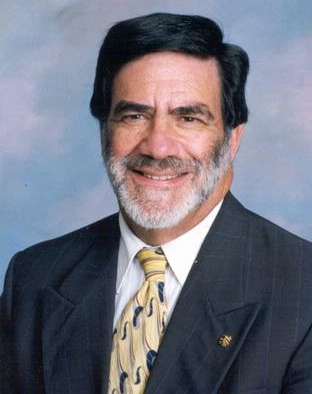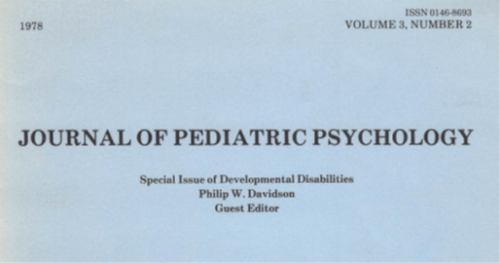HISTORY SPOTLIGHT: In Memoriam
 Philip W. Davidson, Ph.D. (1941-2022)
Philip W. Davidson, Ph.D. (1941-2022)
SPP Officer and Outstanding Clinical Researcher in Developmental Disorders, Neurotoxicology, and Science-Practice Implementation
By Michael C. Roberts, Ph.D., ABPP
Philip W. Davidson, Ph.D. was an excellent scientist as a clinical psychologist employing developmental methodologies. His lifetime work focused on elucidating etiologies of intellectual and developmental disorders and creating community and clinical interventions for those with psychological and physical disorders. In addition, he helped develop and assess services that serve as models of program development and evaluation. As evidenced in his manifold publications and sustained leadership positions, he was a supportive and knowledgeable collaborator, exceptional mentor, and effective teacher. He was caring in his concern for developing effective and inclusive services for those with disabilities. His early service to the Society of Pediatric Psychology (SPP) was essential to the founding of today’s robust organization.
Many of early pediatric psychologists worked in clinics for developmental disorders, often organized through the University Affiliated Programs/University Affiliated Facilities system and funded by federal grants. These programs and facilities offer interdisciplinary training, develop demonstration projects, conduct basic and applied research, and provide technical consultation. Dr. Davidson served as Professor in the Department of Pediatrics and Chief of the Developmental and Behavioral Pediatrics Division at the University of Rochester Medical Center, School of Medicine and Dentistry. In his professional career at the Strong Center for Developmental Disabilities, Dr. Davidson was devoted to clinical research investigating etiologies and treatments for a range of intellectual and developmental disabilities and disorders. He eventually rose through the professorial ranks at the Medical Center to become the Director of the Strong Center. In his many contributions at the University of Rochester, he supervised multiple predoctoral fellows in clinical psychology and postdoctoral fellows in pediatric psychology. His supervisees praised his mentorship and professional role modeling in research and clinical competence with strong ethical underpinnings were notable.
Phil Davidson was born on December 20, 1941, and died on February 10, 2022. He earned a bachelor’s degree in Psychology from Bucknell University (1963), master’s degree in psychology from Villanova University (1968), and Ph.D. from George Washington University in 1970. He completed postdoctoral studies at the University of North Carolina Chapel Hill working with Carolyn and Stephen Schroeder in the Division for Disorders of Development and Learning.
Dr. Davidson served as Secretary/Treasurer of the Society of Pediatric Psychology in its early years (1978-80). Because this was well before personal computers and the internet, he kept the records of the society finances in a shoebox and maintained membership rolls on index cards and communicated with members through postal letters. He published several articles in the Journal of Pediatric Psychology and guest-edited a special issue devoted to developmental disabilities (1978,Vol. 3, No. 2). In the opening editorial, Dr. Davidson noted that he wanted to present
behavioral research that attempts to span the gap between theoretical understanding of developmental disabilities and the application of this understanding in the care and treatment of developmentally disabled persons…The inevitable gap that results between theory and practice while the scientist attempts to test theoretical questions in the laboratory and the practitioner takes a “we’ll use what works” approach to treatment has the ultimate effect of slowing the evolution of a sound and efficient system of care delivery to developmentally disabled persons. It is great importance that the study of developmental disorders be firmly couched in a framework of basic science (p. 56).
Many of the authors of the articles in the special issue became prominent clinical researchers in multiple domains in pediatric psychology and related areas (e.g., Craig Ramey, Dennis Harper, Wayne Adams, Thomas Linscheid, Richard Foxx, Byron Rourke, and James Mulick, in addition to Carolyn Schroeder and Stephen Schroeder).
Dr. Davidson’s earliest work was on haptic visual perceptual activity, including an article in the first volume of the Journal of Pediatric Psychology on the topic of haptic perceptions and blindness (Davidson, 1976). A related article published later in JPP was on haptic conservation of amount in children who were blind compared to children who were sighted (Davidson, Dunn, Wiles-Kettenmann, & Appelle, 1981). The focus on blindness and visual impairment permeated his work in service delivery and applied research over many years. In keeping with his pediatric psychology identity, Dr. Davidson coauthored chapters in the Handbook of Pediatric Psychology (through two editions) on “Psychological Sequelae of Pediatric Infectious Diseases” (Peloquin & Davidson, 1988) and “Neuropsychological Aspects of Pediatric Infectious Diseases” (Palumbo, Davidson, Peloquin, & Gigliotti, 1995).
Throughout his illustrious career, Dr. Davidson’s research included multiple topics within developmental disorders, including mental retardation and autism spectrum disorders, outcomes and impact of community services for persons with developmental disabilities and psychiatric or severe behavior disorders, quality assurance and measurement of education, technical assistance and research transfer, and critical examination of health status and service utilization. Utilizing his wealth of experience and scientific base, he outlined a national agenda for health research and practice in the areas of developmental disorders. Dr. Davidson contributed to advances in research methodology and addressed ethical issues in research and in serving people with disabilities.
As a respected scientist around the world, he conducted multiple international collaborations. The most notable example of this was the long-term direction of the Seychelles Child Development Study in examining neurotoxicity and development. This study comprehensively investigated methyl mercury exposure during the prenatal period and children’s developmental trajectories. Methyl mercury had been identified as a CNS toxin and a teratogen; public health professionals raised concern that even low-dose exposure may produce adverse developmental outcomes. Dr. Davidson, in particular, examined the relationship of prenatal exposure and later development in older children and young adults. Shamlaye, Davidson, and Myers (2020), in the journal, NeuroToxicology (reprinting a 2004 article from a Seychelles medical/dental journal), summarized:
The Seychelles Child Development Study represents two decades of collaboration between the Ministry of Health of Seychelles, a small island nation in the middle of the Indian Ocean, and the University of Rochester, a renowned academic and research institution in North America. The study has established itself as a model of strong longitudinal epidemiological studies and collaborative research between institutions in developed and developing countries. It has produced significant scientific findings and a large number of publications on the issue of methyl mercury from fish in the maternal diet and child development. (p. 315)
The overall findings were summarized that “Confirmation from the Seychelles Child Development Study that the development of Seychellois children is no different from that of children in the US and that exposure to methyl mercury from the maternal diet has no adverse impact on their development, up to the age of 9 years, are important and reassuring findings” (Shamlaye et al., 2020, p. 319). This line of investigation continues as research sophistication improves, and toxins increase in the environment.
In recognition of his significant leadership in research and inclusive services, Dr. Davidson was elected President of the International Association for the Scientific Study of Intellectual and Developmental Disabilities (a global scientific organization to promote research and information exchange on intellectual and developmental disabilities). Multiple aspects of Dr. Philip Davidson’s work at the University of Rochester Medical Center are noted on its website and a complete list of his publications is provided https://www.urmc.rochester.edu/people/20019433-philip-w-davidson
Phil Davidson not only served SPP and pediatric psychology well, he was truly an outstanding clinical researcher in developmental disorders and neurotoxicology by implementing scientifically based-practices. His clinical and research contributions impacted the lives of many people. There are many in pediatric psychology who can trace their career development to his mentorship and supervision; his dedication and kindness were hallmarks of his interactions with families, colleagues, and trainees.
Selected Publications

Cover of Journal of Pediatric Psychology, special issue on Developmental Disabilities, 1978
